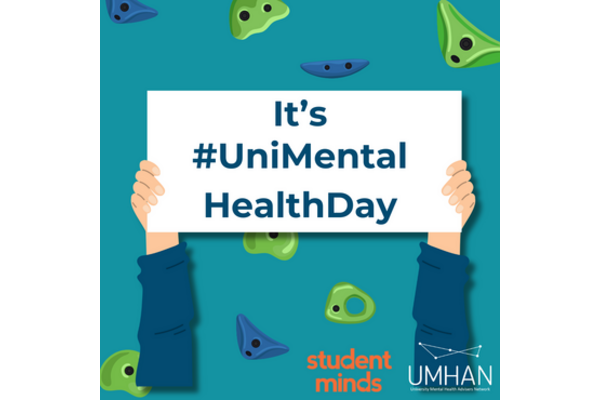Today, for University Mental Health Day 2015, we have almost 60 UK universities getting involved and hosting a variety of events; including wellbeing sessions, guest lectures, photo competitions and film screenings. This year, the theme of the Day is choosing to disclose mental health difficulties, whether this be to a university, support networks or your GP. The aim of the #IChoseToDisclose campaign is to empower people in Higher Education with knowledge and confidence in the process of disclosing.
Mental health difficulties are extremely common; depression and anxiety take up more of a GPs time than any physical conditions, one in four of us consult a GP in any year with mental health-related difficulties and one in three people experience panic attacks at some point in their lives. A mental health difficulty may feel like an isolating experience but, the likelihood is, in most University classes there will be students or staff members with mental health difficulties that are impacting on their studies or work.
A report from the Equality Challenge Unit found 78% of students felt that disclosing to the university had a positive effect on their studies and 74% of staff felt disclosing had a positive effect on work. Despite this, there are many reasons why someone may not have disclosed to the university. We have compiled some responses to a small list of reasons for not disclosing so that you can make an informed decision about whether or not you choose to disclose.
What if I have recovered?
The aim of disclosing to your university is to have a support system in place to help you to access your education. If you feel able to cope with university life then you may have no reason to disclose your mental health history. However, it is worth acknowledging that university can be difficult and you may face unique challenges during this time, with increased independence in all aspects of your life. You may want to consider discussing what you have previously found difficult and what has helped you to recover. This does not take away from your success in recovery but disclosing this information to your university means that support can be put in place in a timely fashion if you should experience any future difficulties.
What if my difficulties aren’t “that bad”?
When you have mental health difficulties, you are often encouraged to access medication or talking therapies but it is less common for you to be encouraged to think about rights and resources. All students who experience mental health difficulties have grown up in a society which still has some prejudice around mental health, this can compromise your insight and give you a low sense of entitlement. Most students with mental health difficulties would consider it reasonable for the University to make adjustments to take account of the needs of a student who used a wheelchair. Many of the same students are a lot harder on themselves and would not expect to have the right to have any adjustment made for them. This sense of low self-entitlement and self esteem can mean that you see your difficulties as ‘not that bad’. Try not to compare yourself to other students, if you are finding things difficult then you may find it helpful to speak about it.
What if I don’t identify with the ‘disability’ label?
It is difficult to find a term that encompasses such a wide range of difficulties and, as far as the Equality Act is concerned, the term ‘disability’ includes anything from physical capabilities, to mental health, to problems with speech and language. Whilst you may not consider yourself to be ‘disabled’, it is true that mental health difficulties can, at times, be disabling and putting support in place can allow you to access your course more easily.
What if I’m concerned about being treated unfavourably after disclosing?
If you should choose to disclose a mental health difficulty, the Equality Act means it would be unlawful for anyone employed by the university to discriminate against you. The university is required to make ‘reasonable adjustments’ to take account of your needs and these options will be discussed with you. If you feel that you have not been adequately supported then there are steps you can take to make formal complaints, this will typically be through your University and Student Union.
What is the benefit of disclosing?
Whilst with any decision there are pros and cons, some decide not to disclose as they may not see how disclosing can be beneficial. It is likely that the university will be instrumental in you creating new support networks. Disclosing mental health difficulties with the university can mean that support is in place in a timely fashion should you need it. Discussing it with the university can mean that adjustments are made which can help you to access your education.
What if I still decide not to disclose?
Deciding to disclose is a personal and unique process and it is important to remember that you have a choice. If, for any reason, you choose not to disclose a mental health difficulty it is not the be-all and end-all. If circumstances change, you can disclose at a later date or there is a variety of self help resources available and other ways of managing your mental health that you may feel are more appropriate for your needs. The purpose of disclosing to a university is to gain support in exercising your rights (e.g. accessing education) and managing your difficulties. This does not mean that if you choose not to disclose you will not be able to reach your full potential. Some people may benefit from additional support but if that’s not the case for you then that’s okay too.
You can join in the conversation about student mental health on social media, using the hashtags: #UniMentalHealthDay and #IChoseToDisclose, where we will be sharing constructive experiences of disclosing and providing you with information about the disclosure process. Remember, there is no right or wrong to whether you decide to disclose or choose not to. It is a personal choice and there will be pros and cons as with every decision. The I Chose To Disclose campaign is about putting you in control, giving you the information to make informed decisions about disclosing and empowering you so that you are confident in whichever decision you make.









